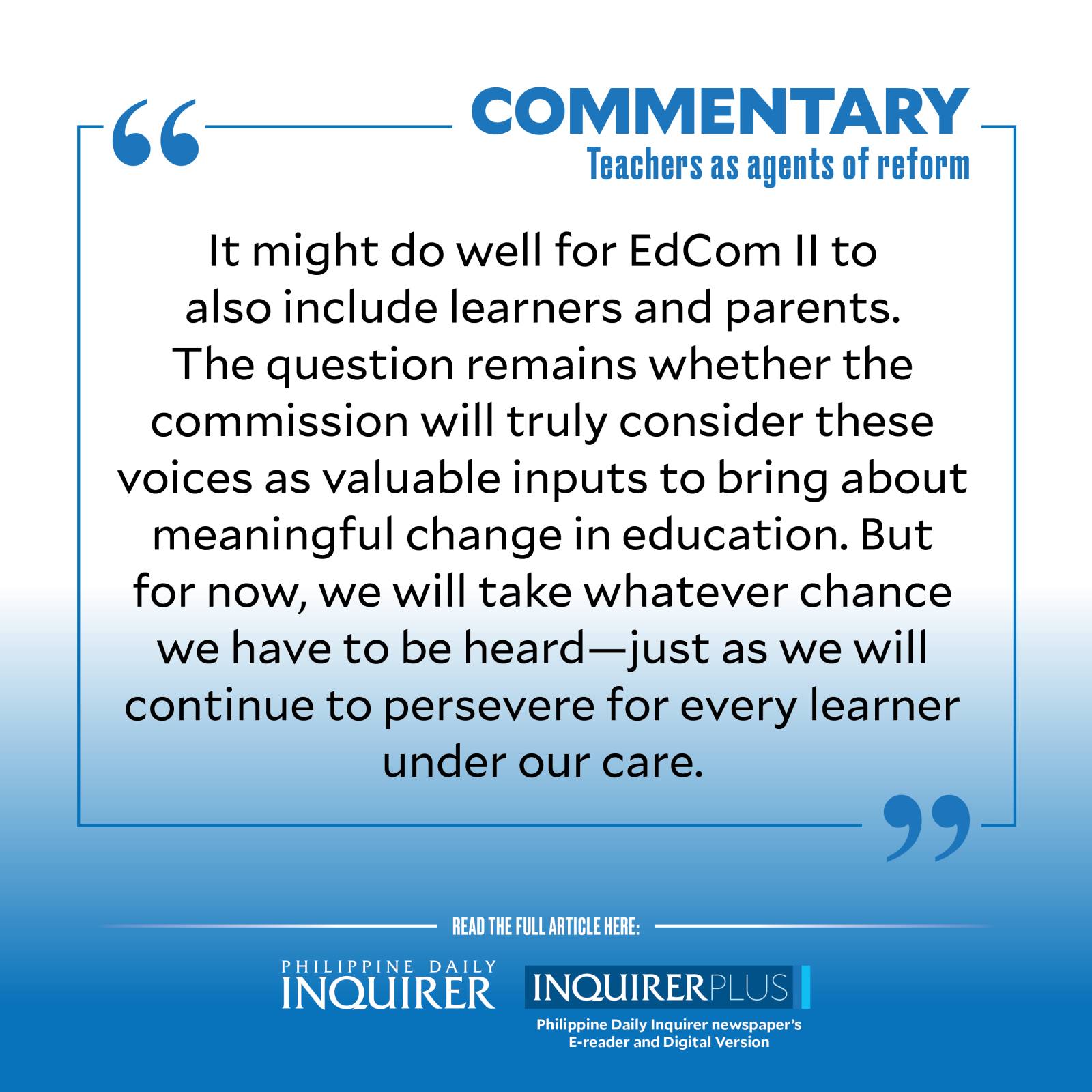
The Philippines has always struggled with educational reforms. We have been dealing with challenges not addressed in the past, learning loss at the present, and pressure to meet future demands. The Second Congressional Commission on Education (EdCom II) aims to study these educational gaps and craft legislative solutions to address them. This commission is composed of our senators, congressmen, experts, and leaders in the education sector.
But what role do teachers get to play in this review? Oftentimes, teachers are treated as objects of educational reform rather than active agents of transformation. Teacher quality is identified as one of the problems in education. This lack of quality is also caused by decades-long dysfunctions. Teachers, just like our students, are victims of a broken system that we are being asked to fix.
We are always at the receiving end of reforms that our roles are relegated to merely implementing the dictates of government. But in our own creative ways and with whatever agency we have, we have silently borne the burden of ensuring learning happens, despite the brokenness of the system. With or without EdCom II, we have been trying to make it work for our students.
And we read about this often enough. Teachers going beyond their mandates just so students can learn when they are hungry, when their homes are far away from school, when they are victims of abuse. The Philippines has always struggled with educational reforms and teachers, who are at the forefront, who have direct influence on student learning outcomes, seldom get to share what we have been experiencing at the frontlines. Harvesting our insights, giving us a seat at the table, and creating opportunities for us to take part in policymaking are crucial in making educational reforms happen.
Thankfully, EdCom II provided an opportunity for teachers to be heard. The subcommittee on basic education gathered 105 private and public school teachers from 74 schools across nine regions for a focused group discussion on topics ranging from the curriculum to consultations on teaching and learning resources, learning loss recovery, assessments, and school governance.
Discussions on the curriculum included ideas on what topics should be prioritized. These “priority topics” are foundational competencies that are absolutely necessary for each stage of the student’s learning journey. Teachers are faced with the reality of not having enough time to cover all competencies, given limitations in terms of resources, especially in terms of school days and instruction hours. It is thus essential to prioritize, and decongesting the curriculum in this way will hopefully optimize the curriculum to best serve both the learner and the teacher.
We also discovered each other’s teaching-learning approaches—an important factor in expanding our horizons and ensuring that we continuously improve and think outside the box. Teachers teach best when they are given the freedom to choose the teaching-learning approaches that they find most effective.
We intensively tackled the language of instruction in our classrooms. How do we, as educators, best instruct abstract concepts to a multilingual student population? How do we ensure that we connect with our learners in a language that they understand? These are the questions at the heart of our discussion then, and I hope will be resolved by EdCom II in the future.
The consultation was a chance to contribute our insights on why previous reforms have not worked and to offer our ideas on what could be effective. In the process, we have also learned from one another and expanded our view of the education system. Having teachers from private and public schools, rural and urban areas, we discovered the uniqueness and similarities of each context. We empathized with each other’s struggles and we also celebrated our wins. There were strategies I learned that I plan to do in my own classes. The best part? That running through all of these discussions is the central question: “What is best for our students?” Para sa bata. Para sa bayan.
And ours isn’t the only voice that should be heard. It might do well for EdCom II to also include learners and parents. The question remains whether the commission will truly consider these voices as valuable inputs to bring about meaningful change in education. But for now, we will take whatever chance we have to be heard—just as we will continue to persevere for every learner under our care.
—————-
Sabrina Ongkiko is master teacher at Culiat Elementary School. She is also a Unicef consultant and program director at the Center for Integrated STEM Education, Inc. She is an active participant in the consultations of EdCom II, a congressional commission tasked to assess the country’s education sector to be able to recommend policies and craft laws for its improvement. More information can be found at www.edcom2.gov.ph.